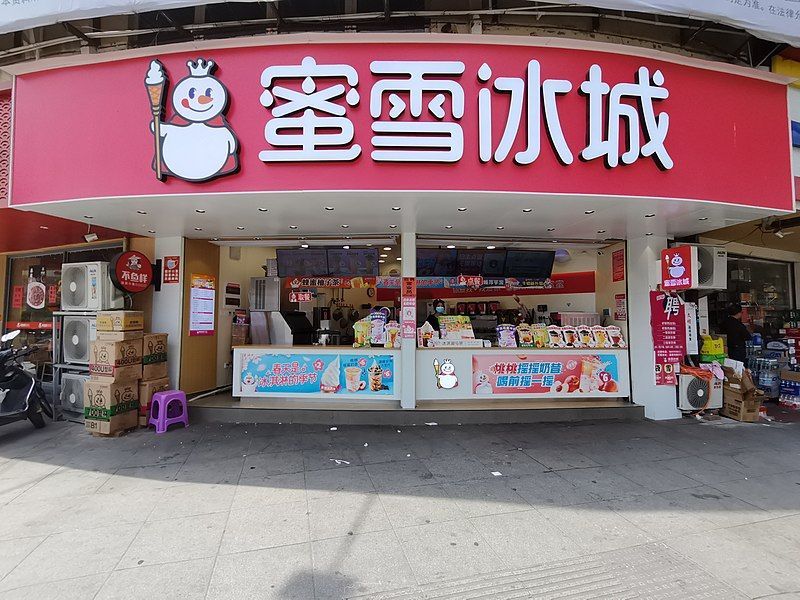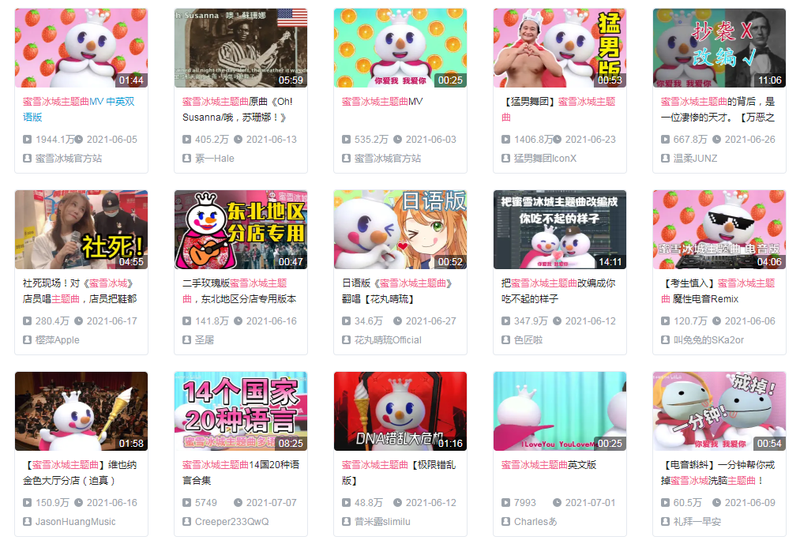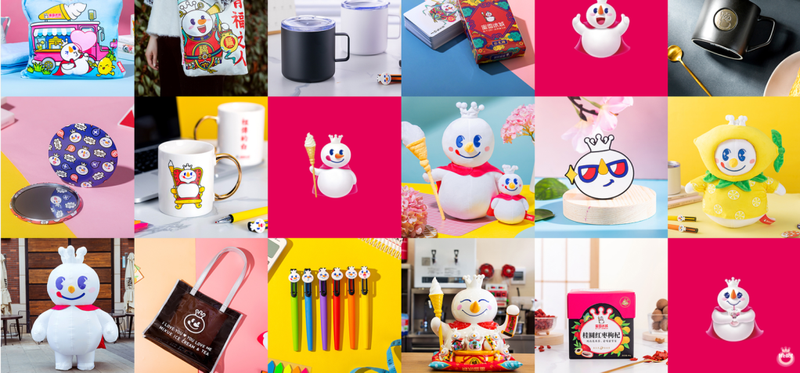icon
password
Multi-select
tags
ID
type
status
slug
summary
category
date
Author
URL
Most people may not expect that this ice cream & tea brand, which already has more than 20,000 stores, was started with an RMB 4,000 loan from his grandmother by its founder, Zhang Hongchao, and his business process is also full of ups and downs.
In our previous article, we introduced the concept of “new milk tea” that became popular in China and Asian markets after 2017. Brands such as Hey Tea have created so many new healthy and flavorful milk teas with fresh fruit, fresh milk and novel ingredients that they are not really milk teas anymore.
But while Chinese investors are frantically investing in these new milk tea brands, a traditional milk tea brand that sticks to milk tea powder has quietly opened its 20,000th store. It has about 25 times as many stores as the new milk tea representative brand, Hey Tea.
Chinese capital markets took notice of the brand in late 2020, and a strange theme song brought it from the depths to the surface in mid-2021. The song titled “Mixue Bingcheng Theme Song” is based on the original song “Oh! Susanna” by the famous American composer Stephen Collins Foster. The rights period of the original song has expired and the song has become public copyright. The theme song was adapted by cutting the complicated parts of the original song and incorporating the brand’s slogan, making it more catchy and memorable.
Mixue Bingcheng, with the phrase “ni ai wo, wo ai ni, Mixue Bingcheng tian mi mi” has become a hit and has entered the vision of more consumers, and its brand image has become more deeply rooted. It literally means “I love you, You love me, Mixue Bingcheng sweety.”
Most people may not expect that this ice cream & tea brand, which already has more than 20,000 stores, was started with an RMB 4,000 loan from his grandmother by its founder, Zhang Hongchao. And his business process is also full of ups and downs, this article will take you to review the development of Mixue Bingcheng over the years.
Start with a cup of shaved ice
In 1997, founder Zhang Hongchao was a fourth-year college student, and that summer he worked part-time at a cold drink store, specializing in making shaved ice. In the course of his part-time job, he discovered the business opportunities and had the idea of starting his own business.
When Zhang Hongchao’s grandmother learned of this, she took out her life savings of 4,000 RMB (About $483 in that year) to support her grandson’s business. So after he graduated from college, he returned to Zhengzhou and find a city village, set up a stall to start selling shaved ice. This store named “cold stream shaved ice” is the predecessor of Mixue Bingcheng, Zhang Hongchao’s entrepreneurial journey began.
Because of the limited start-up capital, the store’s equipment is also extremely simple, with only a freezer, a few benches, and folding tables. Even the shaved ice machine for producing shaved ice is assembled by Zhang Hongchao with bought motors, turntables and Cutter. The store’s main products are also very single, mainly shaved ice, ice cream and smoothies. After business gradually became better, he began to sell milk tea in the store.
With this business, Zhang Hongchao can earn more than 100 RMB a day, but he gradually found a problem: the shaved ice business will be affected by the season, business is hot in summer, but in winter it will become a gap. In order to make ends meet, he had to find a sales job in the gap, but this first store eventually closed down.

Zhang Hongchao was not discouraged, after 1 year he opened a second store and changed the store‘s name to Mixue Bingcheng. The name in Chinese means “A ice castle built with sweety snow”.
After this, Zhang Hongchao also opened a Chinese and Western restaurant, home cooking restaurant in partnership with others, but for various reasons most of them failed to operate. This history is now drawn as a comic strip and placed on the official website of Mixue Bingcheng.
The turnaround brought about by cone ice cream
In 2006, a kind of egg cone ice cream from Japan began to appear in Zhengzhou, and its torch-like shape coincided with the upcoming 2008 Beijing Olympics. As a result, the price of ice cream, which was originally one or two yuan, had increased five or ten times.
Zhang Hongchao found a business opportunity in which he began to study ice cream recipes in his restaurant, and finally determined the ratio of various ingredients. So he opened an ice cream store next to the restaurant and continued to use the name Mixue Bingcheng. He made calculations based on the cost and finally set the price of ice cream at 2 RMB, when other stores were selling for about 10 RMB, so it was not difficult to imagine what had happened. The business has been booming since the store opened, and there are often long lines at the door.
In 2007, the scale could not meet Zhang Hongchao’s ambition, he decided to open franchise rights. That year, dozens of stores were opened on the fly in Henan Province, where the headquarters is located.
In 2008, Mixue Bingcheng was officially established as a company, and the number of franchised stores exceeded 180. But at this time the dairy additives outbreak of safety problems, Mixue Bingcheng’s upstream of the raw material suppliers are also involved, the supply was seriously affected.
At that time, Mixue Bingcheng was still a family business, the company was basically Zhang Hongchao’s relatives, it was difficult to manage. This supply chain incident made the problem completely revealed, and Zhang Hongchao decided to introduce professional managers and optimize the management model.

In 2010, Mixue Bingcheng chose to cooperate with Zhengzhou Baodao Trading Co., Ltd. to develop franchises across the country, further enhancing its corporate visibility and influence.
In 2012, Mixue Bingcheng started to build its modern R&D center and central factory to take the supply chain into its own hands and achieve self-sufficiency.
In 2014, the company established a logistics center in Jiaozuo City, Henan Province, to deliver free materials for franchises across the country. With its own warehousing and logistics center, Mixue Bingcheng’s transit cycle has been shortened and inventory costs and storage costs have been reduced. This has made it the first beverage brand in China to have its logistics delivered free of charge.
Mixue BingCheng also through its own efforts to open up the raw material procurement link, directly and tea production areas, raw material production factories. Its raw material costs are about 20% lower than those of its peers, which makes it more competitive.
At the same time, Mixue Bingcheng also gives franchisees tens of millions of interest-free loans every year to solve their financial problems when opening new stores. The attractiveness of Mixue Bingcheng to franchisees far exceeds that of other brands in the same industry, and the scale of rapid expansion, with its total number of stores breaking 1,000 that year.
At this point, from raw materials to logistics, and then to the franchise stores, the business closed loop belonging to Mixue Bingcheng has been formally formed. Its direct operation with the franchise model also quickly opened the sinking market, through low pricing and high store density to seize market share.
Open Overseas franchises and become a internet explosion
In the years that followed, the Mixue Bingcheng brand grew and tried to expand overseas. in 2018, it successfully entered the Vietnamese market, opening its first overseas store in Hanoi.
The decoration style of its overseas stores is also adapted to the location and incorporates local elements. For example, the stores in Egypt will hang coconuts and other fruits outside the stores, and whatever fruits are hung at the entrance, the stores can provide customers with corresponding drinks or desserts. This simple style is very popular with local people, and now its overseas stores have more than 500.
In the same year, Mixue Bingcheng officially launched its virtual brand image, Snow King, with the position of chief quality control officer and lifelong spokesperson. By this time, the number of its stores had exceeded 5,000.
In 2019, the number of Mixue Bingcheng stores exceeded 7,000.

In June 2020, Mixue Bingcheng has over 10,000 stores in China, the first tea beverage brand to exceed 10,000 stores in China. in July, the “Mixue Bingcheng Theme Song” began to be played simultaneously on TVs in offline stores nationwide.
On June 3, 2021, the theme song was released on Bilibili and Tik Tok platforms, and started its “Road to an internet explosion”. On Weibo, Bilibili, Tik Tok and other platforms, the cumulative plays of the theme song quickly exceeded 2 billion. The Japanese version, Russian version, Rap version, and other versions of the song came out one after another. During that time, whenever you surfed the Internet, you could not avoid being baptized by the “brainwashing cycle”.

At that time, there was even a statement from an unknown source: “Sing this song at Mixue Bingcheng stores and you’ll get a free bill.” This also attracted countless content creators and self-publishers to shoot short videos. And although the official rumor was later debunked, this action to spread the brand image was undoubtedly a big success.
There is a huge gap in consumption power between different cities in China, when consumers in the north, Guangzhou and Shenzhen start to think that a 10 RMB cup of milk tea is too unhealthy to drink and turn to 30 RMB products, there are still a vast number of third-tier cities and rural consumers who want a 10 RMB cup of milk tea.
The problem with other old milk tea brands such as Coco is that they want to continue to compete with new milk tea brands such as Hey Tea in Tier 1 cities, so their approximate prices have been raised from the past level of 10 RMB to about 20 RMB. This level of milk tea is extremely awkward: it can’t offer a creative product like Hey Tea, nor can it satisfy price-sensitive consumers.
Only Mixue Bingcheng, unconcerned about the feelings of high net worth customers, insists on keeping the price of milk tea in the range of 5~10 RMB.
This has even become a meme on the Internet in China, where people take photos of the cheap syrups and powdered flavors that are placed at the entrance of Mixue Bingcheng stores when they are stocked, with the text “Mixue Bingcheng treats us like family and doesn’t pretend not to use low-end ingredients at all” or “Mixue Bingcheng doesn’t mind that you’re poor. You still think it’s unhealthy?”
As of October 1, 2021, the number of Mixue Bingcheng stores has exceeded 20,000, far exceeding the number of stores of peer companies. Naixue and Hey Tea are also the head tea beverage brands in China. The former had just over 700 stores nationwide in December 2021, and the latter had a similar number of stores.
Financing and preparing for IPO
In January 2021, Mixue Bingcheng received an RMB 2 billion financing led by Hillhouse Capital Group and Meituan Longzhu, the company was valued at over 20 billion RMB (About $3.17 billion).

In September, Mixue Bingcheng set up an investment company, Snow King Investment, whose business includes venture capital and other activities. Many industry insiders believe that this move means that Mixue Bingcheng is ready to change from brand operation to capital operation.
On September 29th, Mixue Bingcheng made a counseling filing in Henan Securities Regulatory Bureau and received counseling from Guangfa Securities to make an initial public offering and listing in the A-share market. If Mixue Bingcheng is successfully listed on the A-share market, it will become the second Chinese listed company for new-style tea drinks after Naixue.
If you think of Zhang Hongchao’s grandmother’s RMB 4,000 in 1997 as an investment, today, 24 years later, it has multiplied 5 million times. This can be considered as one of the earliest and most successful investments in the history of Chinese venture capital.
- Author:NotionNext
- URL:https://pandayoo.com/2022/03/08/the-chinese-fresh-ice-cream-tea-brand-that-exploded-on-the-internet-with-its-theme-song-mixue-bingcheng
- Copyright:All articles in this blog, except for special statements, adopt BY-NC-SA agreement. Please indicate the source!